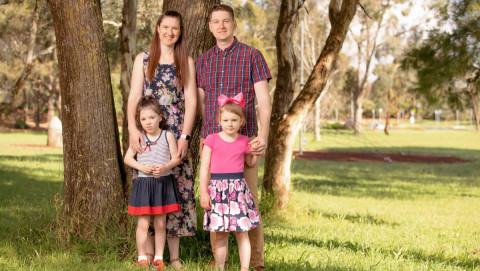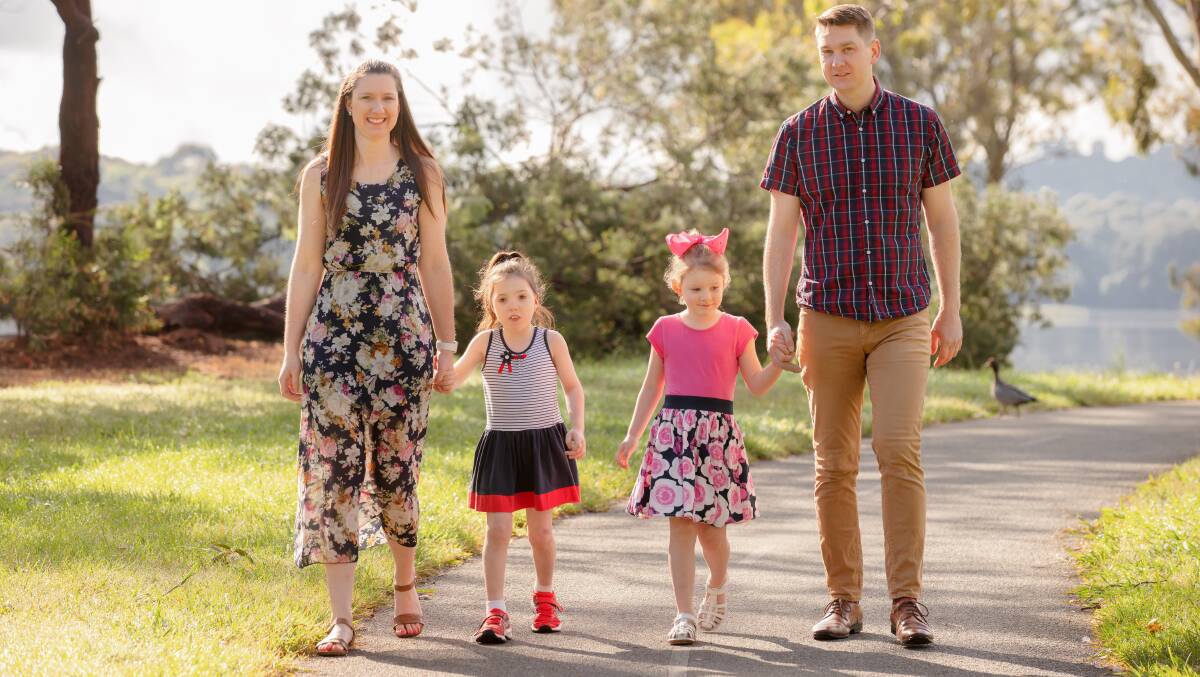
A Canberra couple are worried for their disabled child's future after her National Disability Insurance Scheme funding was slashed against the advice of her therapists.
Belinda and Hugh Clifford have been left distressed and demanding answers after their seven-year-old daughter's funding for much-needed therapy was cut to one-sixth of what her team of specialists had recommended.
The couple say the $10,000 in annual therapy funding which Ashley Clifford has been left with won't be enough to cover even monthly appointments, which will deprive her of the frequent support she needs to develop.
"It actually scares me to think of what what we would do, and how we would have to cut back on that therapy," Mrs Clifford said.
The National Disability Insurance Agency has flagged it would review Ashley's case if it was provided with extra information from her therapists.
The Belconnen-based couple has gone public with their story in the hope the agency will reverse its decision.
This almost makes it so that the funding has no benefit to Ashley at all.
Hugh Clifford
Ashley's case is the latest example of what disability advocates and the federal opposition claim to be mass cuts to participant packages across the country.
The Morrison government continues to push back against the claims, pointing to the rapid growth in the overall cost of the scheme. The government's mid-year budget update included an extra $26.4 billion over the next four years to cover the scheme's surging costs.
The couple say their daughter was referred to more than 30 specialists in the first few years of her life as doctors struggled to diagnose her condition.
She was eventually diagnosed with an extremely rare genetic mutation, which is believed to be the cause of her intellectual disability, autism and ADHD.
"Life for her has been very challenging from the get go, and continues to get more so as her medical specialists and therapists understand more about her," Mr Clifford said.
Mrs Clifford said Ashley needs constant one-on-one support, and is unable to dress herself or go to toilet independently.
After Ashley joined the National Disability Insurance Scheme in 2017, the Cliffords say they have been forced to fight for adequate funding for their daughter every time it came up for review.
Her annual funding peaked at almost $48,000 in 2020, including about $38,000 for therapy. Mrs Clifford said even that amount was not enough, although it was the most they realistically expected.
The couple was confused and upset after Ashley's annual funding was slashed by almost $20,000 when a new plan was issued in October this year - just weeks after Canberra emerged from lockdown.
"I cried," Mrs Clifford said of her reaction when she discovered the cut, which she said came after months of silence from her daughter's provider following a plan review meeting in May.
The couple believed their daughter's funding was cut because the provider had supplied incorrect information to the agency, including listing the wrong disability.
They were advised to apply for a review of the funding based on a "change of circumstance", even though their daughter's situation - including her condition and living arrangements - had not changed.
But rather than restore the lost funding, her package was cut further.
Ashley's package has been reduced to $68,520 over three years, effectively halving her annual funding from the level it was last year.

Belinda and Hugh Clifford fear for their daughter's future after her therapy funding was cut. Picture: Sitthixay Ditthavong
Her therapy funding has been reduced to $10,090 per year, more than $50,000 short of what her team specialists had collectively recommended. Mrs Clifford said all of Ashley's specialists, which included occupational therapists, speech therapists, psychologists and physiotherapists, had recommended weekly appointments.
The couple are concerned that the appointments will now be so infrequent that they won't help their daughter.
"This almost makes it so that the funding has no benefit to Ashley at all," Mr Clifford said.
"It [appointments] is just so far apart, that the continuity of her therapy, and the continuity of that care, is just not sufficient to get progress out of her or any meaningful development."
In a statement to The Canberra Times, an NDIA spokeswoman said it had been in ongoing contact with the family, including to help them request a review of Ashley's plan.
The statement suggested the agency hadn't been provided with enough evidence from Ashley's therapists to justify the level of funding requested. The statement only made reference to her funding for psychology.
"It is important to note when transitioning from the early childhood approach, to the NDIS, participants are required to submit a new application under the NDIS Act," the spokeswoman said.
"Ashley does have funding for psychology within her plan, but in this instance, the NDIA does not currently have reports from the family's treating therapists to support the same level of funding as previous plans for other therapies.
"During the planning process, further evidence of an individual's functional impacts may be required to ensure funding is appropriate for the disability-related supports they need.
"Should supporting documentation be submitted to the agency, the NDIA could consider a review of current funding levels."
In response to the agency's statement, Mrs Clifford cited nine documents, including reports and statements from Ashley's therapists, school teacher and carers, which had been supplied to the agency ahead of the planning meeting in May.
A further psychology report and fresh letter from her teacher were provided in November, she said.
Mrs Clifford said that after the family contacted Labor MP Andrew Leigh for help, the agency had advised that an application from an internal review of Ashley's plan had now been lodged.
"What I want is for Ashley and our family to receive adequate funding and support that she needs for her to cope in society," she said.
Dr Leigh told The Canberra Times that it shouldn't take the intervention of an federal parliamentarian to ensure participants received the support they were entitled to.
"Sadly, Ashley's case is not unusual. Under the Morrison government, the NDIS simply isn't serving the needs of many people with disabilities."